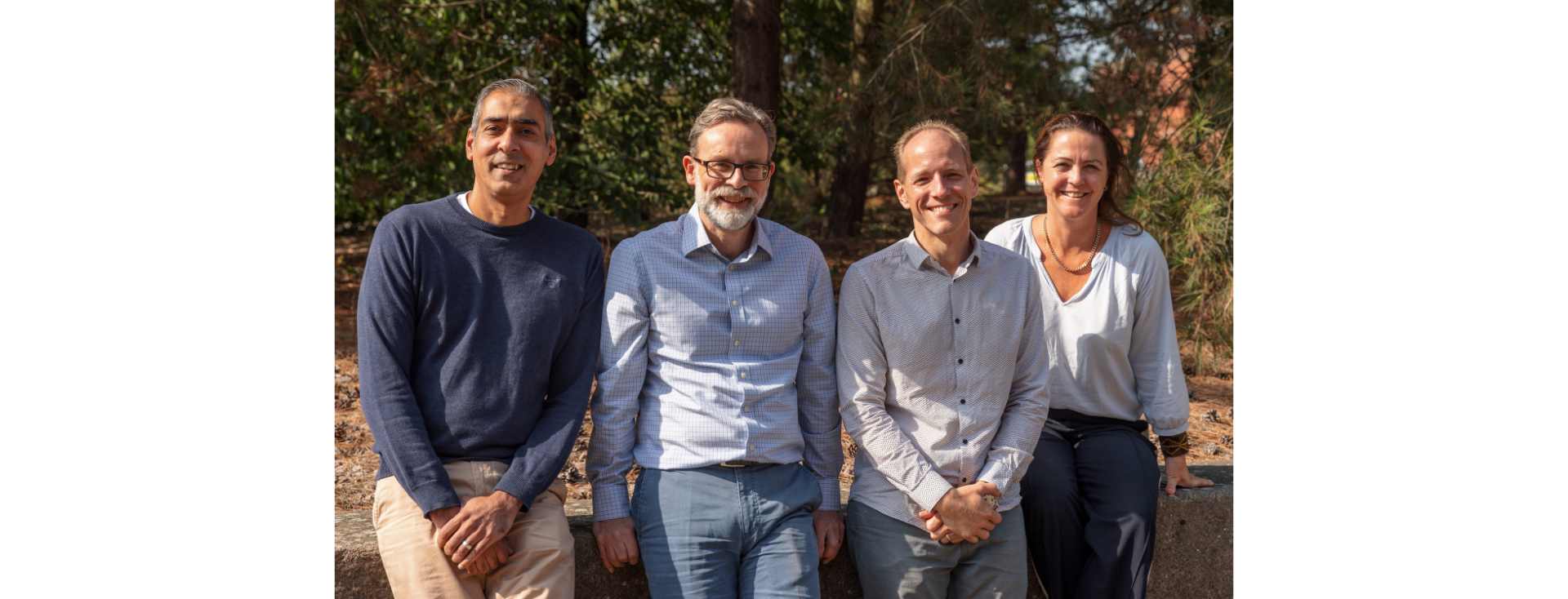Leading the ripples of change: Adrian Black’s journey from coding to cleantech
Sonichem was founded in 2007, and the company has been riding the waves of innovation and sustainability ever since. We have successfully overcome typical growth challenges, from building a dedicated operations team, making our technology scalable and developing a functioning pilot plant, and we are now seeking further investment, including a crowdfunding campaign on Seedrs, to help make our future ambitions a reality. To the average investor, Sonichem’s success may appear to have been forged in science; after all, our ultrasonic biorefinery technology is what underlies our ability to convert forestry by-products into valuable bio-based chemicals. However, the significant commercial progress that we have experienced would not have been possible without the venture expertise and entrepreneurial acumen of our CEO, Adrian Black. This Q&A offers a glimpse into Adrian’s experience in building companies from the ground up, his approach to raising investments and overcoming challenges, and the past failures and successes that have taught him all about scaling a successful business.
Introducing Adrian Black, CEO of Sonichem

I am the CEO of Sonichem, so my role is to fund and commercialise the brilliant technology and the team behind the company. However, I think that it is crucial to point out that I am not a chemist or a biologist. My career path has landed me in the clean tech industry, but I am a computer scientist and software developer at my core.
Career progression from software development to sustainable technology
I am extremely passionate about innovative technologies, and how they can make a difference in the world. Although I do not have any formal training in engineering or science, I have always been drawn to organisations in the STEM industry, whether it has been automotive businesses, online sales schemes or clean tech companies. Throughout the many stages of my career, I have worked on shaping my commercial skills, and business development is all about progression – building new enterprises, forming teams, raising investment and driving progression – no matter what field you find yourself in.
I took my first steps into commerce in the fast-paced automotive sector, where I designed systems and analysed data. The emergence of the internet was causing a major paradigm shift in the business world at the time, and I quickly accepted a CTO position at an online car dealership. Establishing an internet start-up at the very beginning of the technology boom was an extremely risky business move; although the company experienced some initial success – and was registered on the tertiary stock exchange – it unfortunately failed when the ‘dot-com’ bubble burst. This was a valuable learning experience, as the founder of the business abandoned ship at this point, leaving me to build it back up from the ground. It was at this stage in my career that I discovered a love for problem-solving and entrepreneurship, and this inspired me to pursue an MBA to deepen my knowledge in business strategy and finance, and hone my skills in critical thinking and leadership.
After a few more endeavours in the automotive sector – including consultancy projects for eBay motors and Autotrader, and a full-time position working for the Daily Mail Group to set up an online car sales platform – I was drawn to a completely different passion: tackling fraud. Mentored by one of the board directors of the Daily Mail Group at the time, I began to work with the police and security services to establish fraud forums in the major online sectors, and I was one of the founding members of an organisation called VSTAG. This planted the seed of an idea in my head, which grew to become a legal technology company, NorthRow, that is dedicated to developing systems to automatically detect financial, business and advertising scams. I successfully scaled the business to a Series A+ investment round as CEO, before deciding that it was time to move on to a new venture.
It was at this point that my previous mentor, David Dutton – who by now was Executive Chairman of Bio-Sep (now Sonichem) – asked me to join the company to help turn it from what was essentially a research and development project into an investable business. Although I only had a very superficial understanding of the technology and science behind Sonichem at the time, I could envision how it could be made to work at scale. In addition, fighting the global climate problem was an issue that was far greater than fraud, and I felt like the sustainable technology sector had huge potential for expansion. I therefore accepted the position, and that was how I became CEO of a clean tech company!
What, in your opinion, is the key to a successful technology business?
A successful technology business requires a skilled and knowledgeable team, a solid and well-thought-out business plan, and a flexible and forward-thinking approach that enables continuous development and progress. However, no company has ever risen to success without having to navigate difficult waters along the way, so I believe that resilience is another key aspect of success. As CEO of Sonichem, I am constantly refining my own knowledge, and equipping myself with the tools needed to navigate the dynamic challenges of the business world.
Looking back on Sonichem’s journey, what milestones stand out for you?
I was initially introduced to Sonichem at the start of 2021 and, although the company was backed by over 10 years of research, commercial progress was slow. It had not yet received any external investments, its first-generation pilot plant was not yet fully functioning, and it was even lacking a complete team of full-time employees. My goals were to establish a committed and permanent team, enhance the company’s infrastructure and begin to raise investments.
The first step in Sonichem’s growth was taking over the property that housed our pilot plant, and expanding it into a fully-equipped laboratory to carry out our downstream processing protocols in house. We also hired a complete team of chemists to improve the design of our ultrasonic reactor, and to refine and scale up the technology. Since then, we have applied for new patents for our updated technology, and even undergone a complete rebrand! A lot of work has gone on behind the scenes to make the business investment-ready, and we have already raised a significant amount of money – through venture capitalists, angel investors, projects, grants and consortiums – to provide our team with the resources they need. These are all milestones that have made Sonichem what it is today.
How can crowdfunding lead to collective growth at Sonichem?
Sonichem has already grown in leaps and bounds, but the purpose of our new crowdfunding initiative – which we are running through the investment platform Seedrs – is to allow us to continue to operate our pilot plant, and to fund the next stage in the company’s development. We are currently designing a large-scale commercial biorefinery, which will allow us to produce up to 15,000 tonnes per year of bio-based chemicals from forestry waste, making a significant difference in the clean tech sector. Most importantly, crowdfunding is a way for us to expand our reach and accessibility, allowing smaller investors who are interested in contributing to our environmental efforts to participate on the same terms as larger corporations. The global transition towards sustainability is creating vast opportunities in the chemicals industry, and we are well positioned to make a significant impact – and to offer possibilities for substantial investment returns to stakeholders.
Looking to the future, how can Sonichem capitalise on this forward momentum and solidify its position as a leader in the clean tech industry?
Sonichem is in a very good place to experience continued success: the forestry industry is expanding as demand for sustainable building materials soars, so the availability of byproducts such as woodchips and sawdust is rising. While there are other avenues that rely on these waste products – including cement production and the burning of pellets for energy – consumers are increasingly aware of the detrimental environmental effects of these activities, and companies are looking for more sustainable ways to use these readily available resources. At Sonichem, we have developed a clean and scalable way to take these low-grade byproducts and turn them into high-value bio-based chemicals. In addition, our technology is highly flexible, and it has the potential to make an impact in a wide range of industries that produce biomass, including the palm oil and sugar cane sectors. We have already been granted patents in 10 different markets around the world, demonstrating our potential for expansion.
All of these factors point to Sonichem’s growing potential to make waves in the chemicals industry, and our current crowdfunding initiative is the first step in our plan for the future, as we seek funding to drive our production of green chemicals and reduce society’s reliance on fossil fuels.

